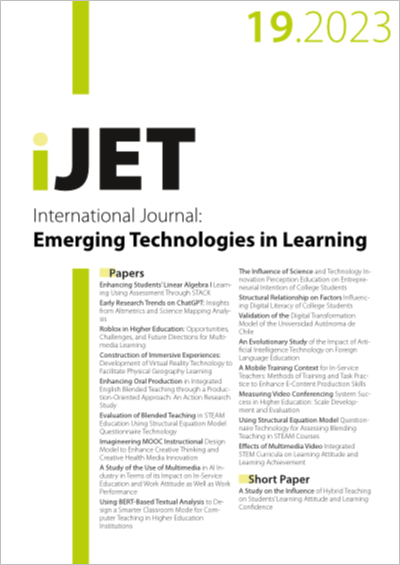Effects of Multimedia Video Integrated STEM Curricula on Learning Attitude and Learning Achievement
DOI:
https://doi.org/10.3991/ijet.v18i19.43911Keywords:
multimedia video, STEM, learning attitude, learning achievement, learning gainAbstract
Along with the advance of 3C technology and the promotion of education reform, multimedia video information equipment is largely combined in the education scene for student-centered course teaching. Including multimedia video in instruction for curriculum design provides students with diverse teaching and learning methods. It is expected to enhance students’ learning attitudes and achievements through vivid and active multimedia video situations, as well as guide students’ interests and achievements in learning. Taking 188 college students in Guangdong Province as the experimental objects, the 16-week (3 hours per week for a total of 48 hours) multimedia video integrated science, technology, engineering, and mathematics (STEM) experimental teaching research is preceded by this study. The research results show that: (1) students present a positive learning attitude as they expect to understand more of the taught content from multimedia video-integrated STEM curricula; (2) multimedia video-integrated STEM curricula provide students with effective learning; and (3) the use of multimedia video provides more opportunities and information for students to understand STEM-related information. The assistance of multimedia video could enhance their willingness to learn and creativity in STEM curricula. According to the results of proposed discussions and suggestions, it is expected to provide students with diverse learning methods and build students’ learning concepts without restricting learning to time and place.
Downloads
Published
How to Cite
Issue
Section
License
Copyright (c) 2023 Chich-Jen Shieh (Submitter); Yi Meng, Li-Shan Chen

This work is licensed under a Creative Commons Attribution 4.0 International License.



